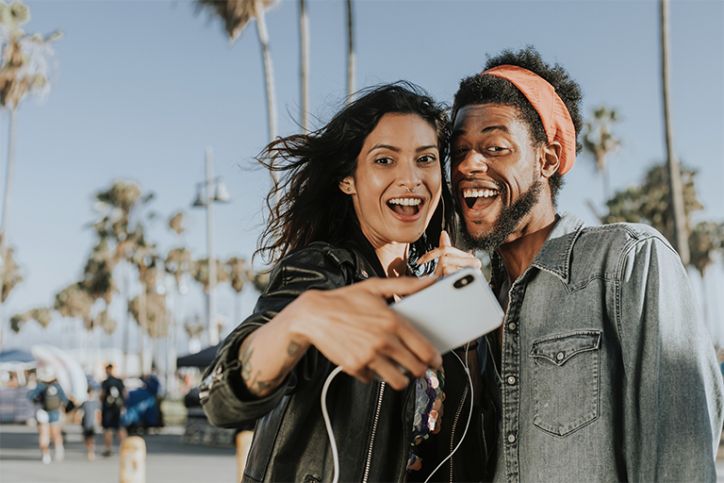F8 — The Facebook Developer Conference
For the Blog Post Scanners Out There, Here Are 10 Predictions:
Three themes are threaded throughout these predictions: expression, Messenger, and video/VR. Let me know what you think in the comments below!
1. Facebook will Release More Forms of Expression with Live Filters, a Snapchat-esque Feature
2. Facebook will Release Enhanced Profile Picture Frames across Phone Platforms, another Snapchat-esque Feature
3. Facebook will Launch Original Series, Film, and Virtual Reality Programming
4. Facebook will Release a Facebook Video Network
5. Facebook will Announce More eCommerce Tools for Messenger with Facebook’s AI Assistant M
6. Facebook will Open up M for Facebook Developers
7. Facebook will Push Instant Articles
8. Facebook will Announce More Advertising Options for Publishers: Target Ads Based on Reactions!
9. Facebook will Announce Improved Facebook Search Based on Image, Audio, and Video Content based on Machine Learning
10. Facebook Will Release a Neural Interfacing Product to Complement Oculus
For those looking for more information behind these predictions, read on!
Facebook’s F8 Conference is Coming April 12–13
Facebook’s 2016 F8 developer conference is right around the corner taking place in San Francisco on April 12–13 at the Fort Mason Center. Developers will fly in and tune in through live broadcasts from all over the world to hear what will be announced. F8 serves as Facebook’s bat signal to the developer community on what new products and tools are important to pay attention to, being developed, and are launching. It’s also a chance for developers to not only connect with one another but also connect directly with the Facebook team. In general, this is the mecca of all things Facebook that has my inner Facebook nerd doing cartwheels! Already there’s been a lot of speculation on what’s going to be announced and just yesterday, Facebook released the new and improved Live Video product for users.
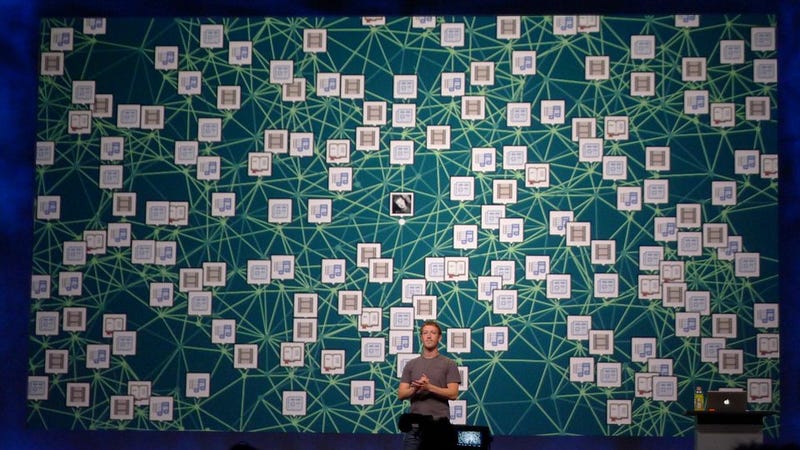
A Look Back at Other F8 Announcements
Past F8 conferences had seminal announcements like the social graph and Facebook Platform (2007), new Facebook profile and Facebook Connect for websites (2008), Like button and Open Graph (2010), and Timeline (2011). In 2014, Facebook focused more on being the cross-platform platform, and in 2015, the biggest announcement was the launch of the Messenger Platform.
Of course last year saw a lot of other exciting announcements for marketers, brands, and developers alike including more analytics for apps and more video tools for publishers. Facebook also gave a preview of Internet.org’s efforts to bring Internet to the world through their Aquila Unmanned Aircraft that will beam it to users in addition to giving us a glimpse at why they think virtual reality is the next frontier of content.
Facebook also focused on its family of apps, including WhatsApp and Instagram, although they didn’t announce anything groundbreaking on either of these two fronts…which I have a suspicion will be very different this year! (If you’re curious, all of the sessions from 2014 and 2015 are handily archived on the Facebook Developers Live website.)
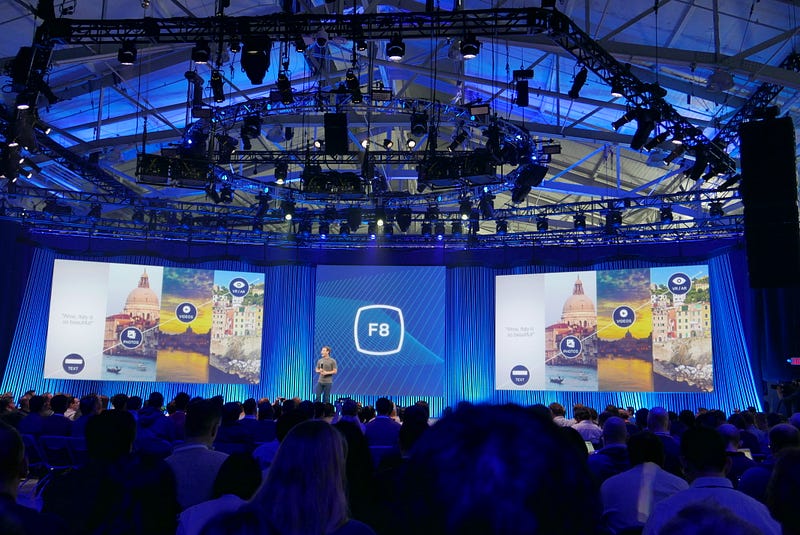
Mark Zuckerberg’s 2015 Keynote on Evolution of Content on Facebook
2015 Set the Stage for 2016’s F8 Announcements
One of the biggest announcements that stood out to me from the 2015 F8 was when Mark Zuckerberg explained why Facebook is investing in virtual reality: it comes down to how Facebook users express themselves. Through the progression from text to photos to video, immersive video and experiences in the form of augmented and virtual reality is the next evolution in content bringing viewers closer to the experiences being shared. Last year “spherical video” (aka 360 video) was announced as being supported on Facebook.
Since then, we’ve seen Live Video take off on the platform…and on competitor apps too, ahem, namely Snapchat. Live Video fits into the trend of bringing people closer to a user’s world by offering a raw glimpse into that person’s world. As more people get comfortable with filming themselves, we’ll see this trend adopted more and more by users.
The end game to this race for Snapchat and Facebook is to mimic as much of how we communicate offline, online and give us the tools to enhance how we express ourselves. While we still may be years away from experiencing virtual reality in the News Feed, Facebook is emphasizing video in its algorithm which is helping push/have the product embraced by users both from a content production and consumption standpoint.
Without a doubt, we can expect to hear more about Facebook’s vision for video at this year’s F8, including how it is getting more of the traditional television viewing pie!
Predicting What’s Next
One of the fun aspects leading up to F8 conferences is reading and coming up with predictions on what Facebook is going to announce and then seeing who was right and who absolutely missed the mark. What can we expect this year? Here are my predictions based on current trends and educated suspicions! Three themes are threaded throughout these predictions: expression, Messenger, and video/VR. Let me know what you think in the comments below!
10 2016 Facebook F8 Developer Conference Predictions
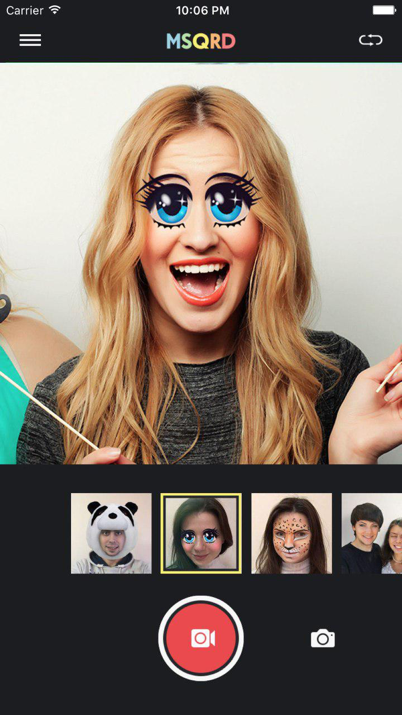
Masquerade Live Filters
1. Facebook will Release More Forms of Expression with Live Filters, a Snapchat-esque Feature
The content that users share online and through messaging apps is about expressing themselves. Today there are more forms of expression than ever before, ranging from photos, videos, emoticons, Bitmojis, and GIFs. It’s no surprise that Facebook launched Reactions to give people more ways to express feedback to stories shared in their Facebook News Feeds.
With the rising popularity of Snapchat, Facebook is clearly paying attention to the new unicorn app. They’re doing a lot of interesting things and in particular to this prediction, one product that Snapchat released that is genius is Animated Selfies, sometimes referred to as Lenses.
This is an entire other blog post, but in short: selfies aren’t going anywhere anytime soon as Sam Lessin outlines in his “Selfies, Emoji and the Economics of Communication” post on The Information. No matter what avatar replication we can create for ourselves, nothing can relay our expressions better than our own faces. Snapchat has taken the selfie and given users the ability to enhance them with light-weight and silly animations like rainbows coming out of people’s mouths through their acquisition of Looksery (yes, this is how we’ve evolved in our form of expression!). Users can capture still images with these Lenses or record mini videos with the animations overlaying their faces. It’s still genius on Snapchat’s part AND it allows advertisers an opportunity to literally offer content that will end up plastered on users’ foreheads to share with their friends — you don’t get better product placement than this online.
Twitter hasn’t been lost on the power of easily editing content before it’s published and will soon release “Twitter Stickers” (although this may be more of a sign of Twitter grasping at straws versus a meaningful, strategic move).
We’ve seen Facebook adopt other successful aspects from competitors before (like real time News Feed updates following the success of Twitter), and this time will be no different. Facebook recently acquired Masquerade, which more or less offers animated selfie-esque enhancements to user videos. They use the terminology “Live Filters” for these enhancements.
Following the announcement of Live Video, my guess is that Facebook is going to offer Live Filters on top of Live Video and push it through Messenger in addition to the News Feed, Events, and Groups as an enhanced way to chat with friends. Users already share a ton of stickers on Messenger to express themselves and it’s a more private space to experiment with Live Video (and of course, is more Snapchat-like too!).
There’s one session in the F8 schedule where I’ll see how right this prediction is! The session that hints at this is “Messenger: The Future of Communications” with the description of “Meet our engineers and hear about how Messenger is reinventing online communication and self-expression.”
2. Facebook will Release Enhanced Profile Picture Frames across Phone Platforms, another Snapchat-esque Feature
Facebook already allows its mobile iOS users to create GIF-like Facebook Profile Videos (ahem, closely resembling the Snapchat GIF user profile pic). It wouldn’t be a stretch to see Facebook rollout this feature across phone platforms and encourage users to enhance their profile photos this way. In the ever-changing world of Facebook vocabulary, it looks like “Profile Picture Frames” may refer to an all-encompassing term of GIFs and/or their version of Apple’s Live Photos.
Orrrr, their Masquerade acquisition may take a different form than Prediction #1 states! Facebook could also potentially roll out Live Filters over Profile Picture Frames to enable users to create a new GIF-like form of expression that can be shared on the News Feed or through Messenger.
Since users can upload their own videos for Profile Videos (unlike Snapchat), this also opens up the opportunity for developers and companies like GIPHY to give users more options to express themselves on Facebook in regard to enhanced selfies or Profile Videos/Picture Frames…however this product will take shape or be called.
The F8 session in the schedule that will speak to this prediction is titled “Enabling Self Expression with Profile Picture Frames and Videos.” It’s description states “Profile frames and videos have opened up a new means of self-expression on Facebook. In this session, we’ll share what we’ve learned recently.”
3. Facebook will Launch Original Series, Film, and Virtual Reality Programming
Apple is rumored to be getting into original programming and Amazon and Netflix are already battling it out. At this year’s Sundance, Amazon and Netflix were the two biggest movers and shakers snapping up films for their online streaming distribution. With Facebook’s enormous emphasis on video, it could be a possibility that they’re getting into the game too. More and more we’re reminded of Facebook’s audience scale and how Facebook reaches more people than traditional television.
Facebook is already producing original content in two ways. Through their Oculus Story Studio, Facebook is already producing original VR films and experiences. This is a really smart move on their part as they’ll own the full chain from content production, distribution, and hardware not too dissimilar than old studios back in Hollywood’s heyday. Also, Facebook is already producing content on behalf of brands through their Anthology Branded-Video Program. Since they’re pushing video more and more on the platform, why not expand these two programs to produce their own original series and films?!
Facebook is definitely ramping up their production capabilities starting with a new and massive office space in Los Angeles and by also hiring more production talent as this Facebook Producer, Creative Shop Studio job description reveals.
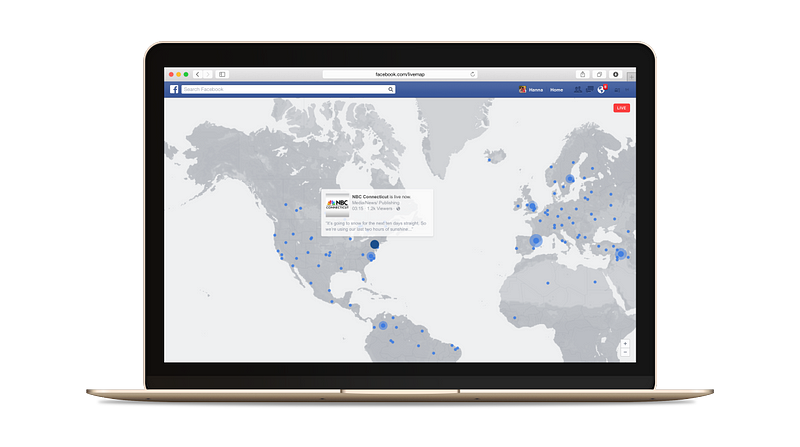
Facebook Live Map
4. Facebook will Release a Facebook Video Network
Instead of Prediction #3 taking place, what’s more likely is that Facebook is going to release a Facebook Video Network with different channels organized by topics. With the launch of Live Video, Facebook is already giving the streaming content a dedicated place on its mobile app as it describes on the product’s website as a place “where you can discover live video that the world is talking about, live video from the friends and creators that matter most to you, and live video on topics you’re interested in.” They’ve also released a Live Map where you can see live videos being broadcast anywhere from the world; however, the Live Map actually isn’t an organized way to find content and the “discovery” mechanism is only dictated by location which its novelty will quickly wear off.
More than anything, launching a more organized way for users to find content makes sense for two reasons: Facebook, whether it admits it, is going after traditional television time/viewers and this would be a significant way to take up more of the pie.
Additionally, while the News Feed is extremely important in surfacing what Facebook thinks is most important to users, the user behavior of consuming video can be tricky to figure out, just ask Netflix who no matter how many times updates its recommendation algorithm always seems to miss the mark IMHO. Jessica Lessin, the Founder & CEO of The Information, wrote a great article exploring “The End of Streams.” In it, she shares this about (surprise, surprise!) Snapchat: “Snapchat’s contribution has been to create channels out of videos and photos its users upload about particular events or locations and to let publishers program their own channels through Discover. It’s a smart idea and the closest thing to reinventing television that I have seen. And the channels I see can be personalized to me. They’re also self-contained. You can watch to a specific end point, which can make them satisfying to consume.”
In the F8 schedule, there’s a session called “The Future of Video on Facebook” that is described as “Facebook is the best place for people to discover, watch, and share videos that matter to them. Learn how to engage audiences and create value for your business with video on Facebook, and see what you can do with immersive new formats like Live and 360 video.” More than likely it’ll be optimizing video for the News Feed, but if we’re lucky, it’ll include a new Facebook Video Network too.
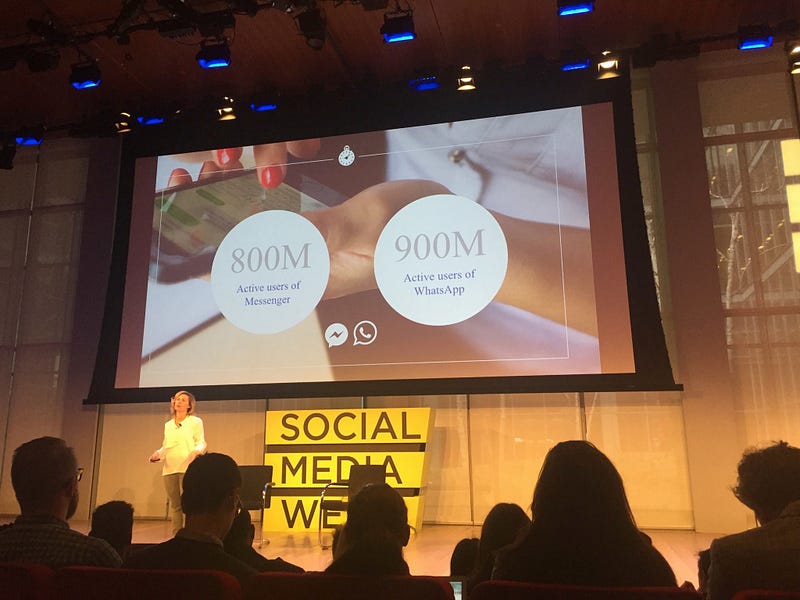
Messenger has 800M Active Users as Announced by Michelle Klein, Head of Marketing for North America at Facebook, at Social Media Week NYC
5. Facebook will Announce More eCommerce Tools for Messenger with Facebook’s AI Assistant M
The Information already leaked some news about this announcement in its article “Facebook Messenger Prepares In-Store Purchase Service” that shares, “But the unreleased features suggest Messenger’s push to shape itself as a social commerce platform is accelerating more quickly than previously known. And the interest in store purchases is notable. The software includes commands allowing a user to “pay in person” or “pay directly in Messenger when you pick up the item” with “no cash needed.”
One of the more interesting applications I’ve read about Facebook’s AI M product and Messenger is this tidbit released on Facebook’s Engineering blog titled: “Teaching machines to see and understand: Advances in AI research:”
So what happens when you start to put all this together? Facebook is currently running a small test of a new AI assistant called M. Unlike other machine-driven services, M takes things further: It can actually complete tasks on your behalf. It can purchase items; arrange for gifts to be delivered to your loved ones; and book restaurant reservations, travel arrangements, appointments, and more. This is a huge technology challenge — it’s so hard that, starting out, M is a human-trained system: Human operators evaluate the AI’s suggested responses, and then they produce responses while the AI observes and learns from them.
My guess is that Facebook is going to release M worldwide through Messenger to help users purchase items. Last year at F8, Facebook announced Messenger for Business and this year I think we can expect to hear a lot more about Facebook’s vision for eCommerce, Payments, and AI in this space.
The session “Leveraging Facebook as a Platform for eCommerce” hints at this with the description “People use Facebook to discover and engage with products and services, increasingly on mobile. Hear tips to help businesses drive discovery and sales on Facebook.” Then there’s also the session “Lessons on Growth from the Facebook Payments Team” which is described as “With the growth of mobile commerce, Facebook has evolved to become one of the most sophisticated mobile payments platforms in the world. Learn about the team’s growth tactics that developers and marketers can replicate to grow their businesses.”
The 5 Remaining Predictions I Ran Out of Time to Write Out Completely and a Few Notes
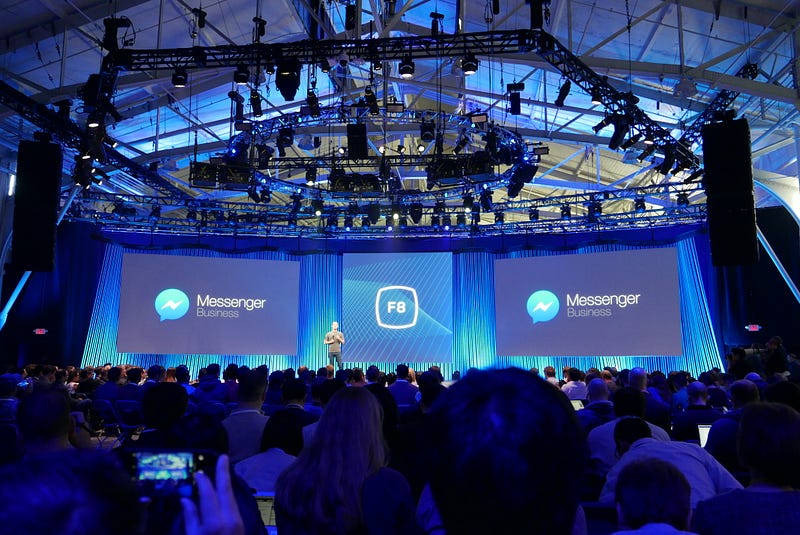
Mark Zuckerberg Announcing Messenger Business at the 2015 F8
6. Facebook will Open up M for Facebook Developers
Who knows, it’s possible! If they’re opening up their React API, why not M too?
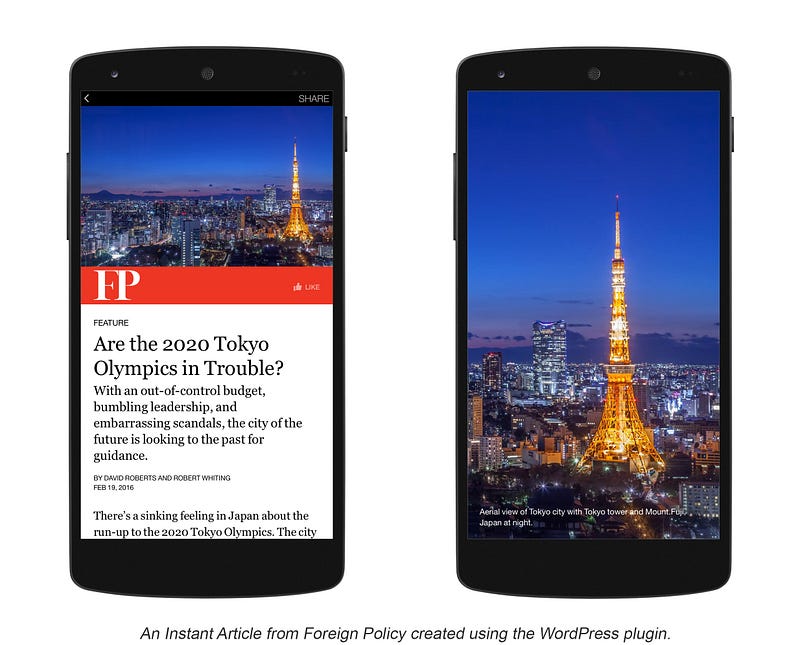
7. Facebook will Push Instant Articles
We’ll learn more about Instant Articles: On April 12th at Facebook’s F8 conference, we will open up the Instant Articles program to all publishers — of any size, anywhere in the world. We invite you to register your interest below. (https://instantarticles.fb.com/)
Session: Creating Value for News Publishers and Readers on Facebook “Facebook is a place for people to find, share and discuss news that matters to them. Discover new opportunities to grow your business and learn more about creating immersive mobile experiences with Instant Articles.”
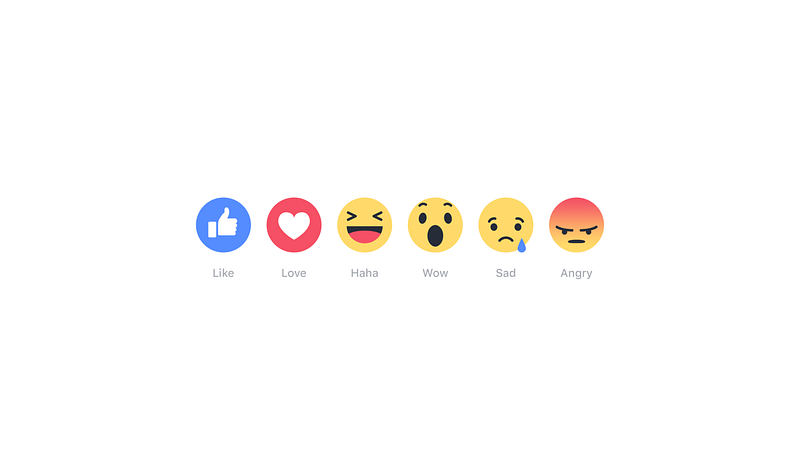
The Facebook Reaction Buttons
8. Facebook will Announce More Advertising Options for Publishers: Target Ads Based on Reactions!
What we’ll probably actually hear more about is Canvas: https://www.facebook.com/business/news/introducing-canvas
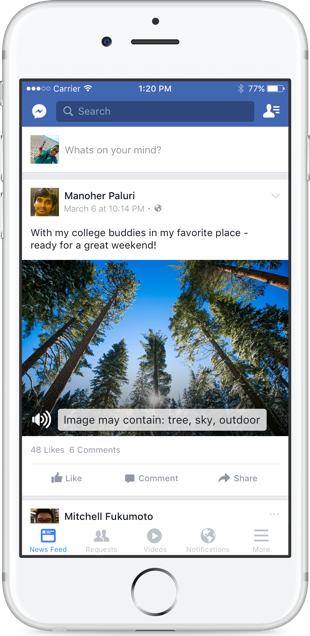
Facebook’s Automatic Alternative Text
9. Facebook will Announce Improved Facebook Search Based on Image, Audio, and Video Content based on Machine Learning
Google does it: https://nakedsecurity.sophos.com/2016/02/29/google-knows-where-your-photos-were-taken/
We know Facebook can predict who’s in your photos: https://research.facebook.com/publications/web-scale-training-for-face-identification/
And can read what’s in them for the blind: http://techcrunch.com/2016/04/04/facebooks-tool-to-help-the-blind-see-images-just-launched-for-ios/
Wouldn’t it be nice if we could search for content based on what’s in images, audio, and video?
(Side prediction: I’m sure Snapchat is working on scanning images and videos for advertisers as it’s the main data they have on their users!)
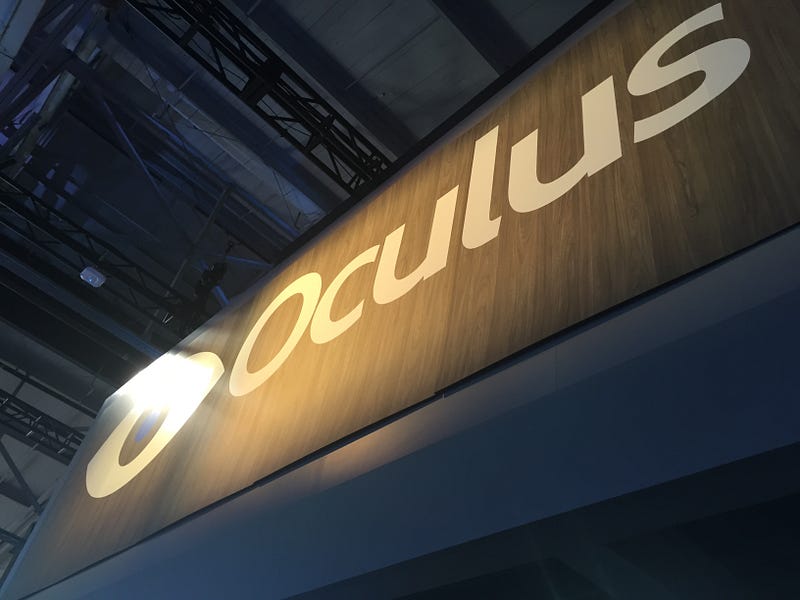
Oculus Demo Testing at the 2015 F8
10. Facebook Will Release a Neural Interfacing Product to Complement Oculus
This one may be a little far-fetched for this year’s conference, but it doesn’t mean it won’t happen down the line!
Mark Zuckerberg wrote in a Facebook comment, “One day, I believe we’ll be able to send full rich thoughts to each other directly using technology. You’ll just be able to think of something and your friends will immediately be able to experience it too if you’d like. This would be the ultimate communication technology.”
With VR and Oculus, presence and empathy are the name of the game. We’re closer to tapping into emotions. Soon, we’ll be able to share feelings without emojis, just the feelings themselves and neural interfacing is the future in this regard. This prediction is ahead of its time, but it is coming.
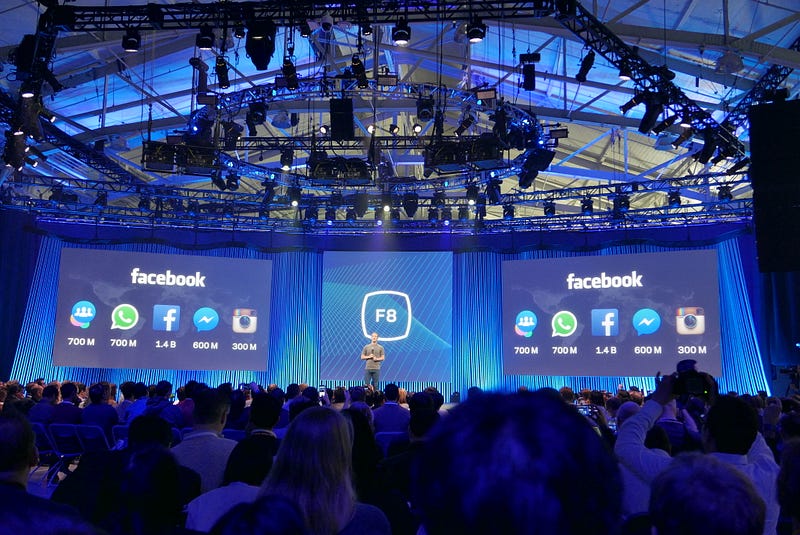
On Instagram and WhatsApp: One thing left out of these predictions are any major announcements for Instagram or WhatsApp. It’ll be interesting to see what Facebook will announce on these fronts, but I suspect we’ll see more integration among Facebook and these apps more than we ever have before, since we’re already seeing it with Instagram Ads: “When people tap your ad’s photo, they will see an overlay confirming their intent to click through to your website. The overlay shows your Facebook Page name along with the display URL you provided when creating your ad.”
In Closing
This year Facebook is teasing us on F8’s website with copy that reads “You’ll learn about the latest tools and best practices for designing and building your app, new surfaces for discovery and expression and innovative ways to make the world more open and connected.” What will Facebook actually announce? We’ll have to all find out next week and see I got any of these predictions right. Do you have any other predictions? Do share!


